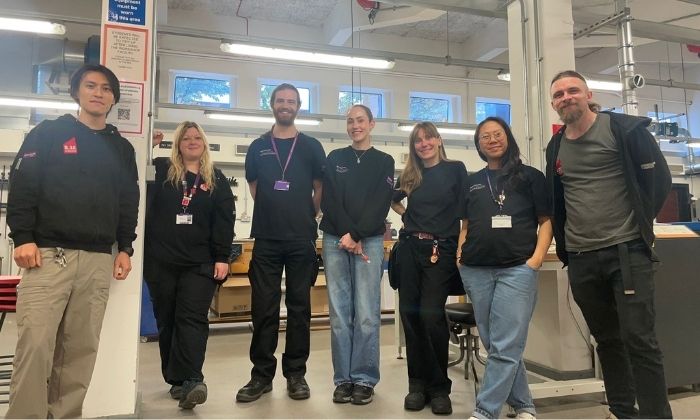Humanities labs awarded LEAF certification for sustainability
31 Oct 2025
All three of the facilities across the Faculty have now been accredited by LEAF, a framework created to improve the sustainability and efficiency of laboratories.

The Faculty’s Geography, Archaeology and Architecture labs have now all been accredited by the Laboratory Efficiency Assessment Framework (LEAF), a sector-wide framework created to drive efficiencies and sustainability across research and teaching laboratory spaces.
Followed by 85 institutions globally, LEAF was established by UCL to encourage laboratory operators to reduce their carbon emissions and create environments that support research quality. The framework assesses labs across five categories: waste, people, sample and chemical management, equipment, and ventilation. Depending on how many actions have been taken to improve sustainability, institutions can achieve either a Bronze, Silver or Gold certification.
The University is committed to achieving our sustainability commitments as outlined in the Environmental Sustainability Strategy 2023-2028, with one of the targets being for all University laboratories to achieve a Bronze LEAF award by 2025.
With the Archaeology lab previously receiving a Silver award and the Geography lab being certified as operating to a Gold standard, the announcement that our Architecture lab has received a Bronze award means a full set of LEAF accreditation across the Faculty.
John Moore, Faculty Head of Technical Operations, said: “It’s brilliant to see that we’ve achieved LEAF accreditation across all Faculty laboratories and workshops, which demonstrates the teams’ strong commitment and hard work towards sustainability and the University’s Environmental Strategy.”
Lara Gerrard, Workshop Technician in the Architecture lab, shared why the LEAF accreditation is so important: “It recognises our commitment to high standards of safety, efficiency and sustainability. By making small positive changes, we all contribute to reducing our environmental impact.”
LEAF accreditation not only contributes to the University’s sustainability goals, but also helps to give our students more immersive learning experiences.
Dr John Piprani, Archaeology Specialist Technician, said: “It shows we take responsibility for the environmental impact of our laboratory-based teaching and learning processes.
“An example of how we achieved a Silver award is using bottle glass rather than flint in our stone tool making workshops. It is easy to acquire in the northwest of England and debris created by the student learning process is easily recycled.
“Importantly, the student takes part in not just the making process, but also in the re-use and recycling elements.”
Considering how to further embed sustainability into their work is still firmly on the lab technicians’ agendas, from making more considered choices when it comes to purchasing equipment, to sharing best practices with other colleagues.
Jon Yarwood, Geography Laboratory Technician, said: “Sustainability is something we’ve sought to continue to build on since receiving our first Green Impact Bronze Award back in 2013.
“From that, we’ve looked at how we can improve, quickly stepping up to Gold for that accreditation, continuing with the University’s 10,000 actions, and now pursuing the LEAF scheme.
“We’ve attended University-wide groups and external conferences where we’ve shared ideas on where to improve internal procedures and discussed with suppliers which consumables and other equipment is available through their own ranges to improve sustainability.”
Dr Anke Bernau, Senior Lecturer in Medieval English Literature and Faculty Associate Dean for Environmental Sustainability, described the achievement as a "terrific accomplishment", sharing: “It’s really wonderful to have all of our Humanities labs LEAF-accredited. That this could happen so quickly testifies to a commitment to environmental sustainability that goes back many years and is part of an ethos in our labs. We’re so proud of our colleagues’ work."
